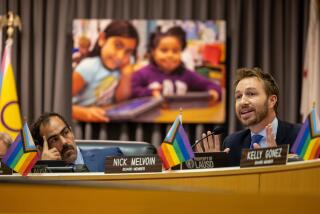FCC Hangs Up on 10-Digit Dialing Proposal
- Share via
WASHINGTON — The Federal Communications Commission formally rejected a controversial proposal Thursday that would have forced telephone users to dial area codes for every call they make.
The five-member commission unanimously adopted a staff recommendation that such a step--though it might alleviate the shortage of available telephone numbers in the U.S.--is not needed at this time and would be disruptive to consumers.
“As all of us know, area codes are a very emotional issue,” said FCC Chairman William E. Kennard. “Though there are some benefits to 10-digit calling, we are sensitive to consumer concerns.”
The FCC began studying the idea earlier this year as a way to conserve telephone numbers, which some experts have predicted could be exhausted over the next decade because of the spread of cell phones, computers, pagers and other devices.
Requiring callers to dial area codes for every call, even those in the same area code, could potentially free up 1.5 billion telephone numbers, FCC officials estimated. Mandatory 10-digit dialing is already in use in about half a dozen large metropolitan areas.
But after reviewing the matter, FCC staffers agreed with several state utility commissions, particularly California’s, which oppose mandatory 10-digit dialing as unnecessary and not worth the consumer confusion it might cause.
Last year, outcry over mandatory 10-digit dialing in West Los Angeles led the California Public Utilities Commission to scrap the idea.
Instead, the FCC voted Thursday to adopt a plan similar to one implemented in California that requires phone companies to prove they are using their existing numbers before they are given new ones.
Beginning next year, telephone carriers seeking additional numbers will need to demonstrate to the FCC that they are using at least 60% of their existing supply. That threshold will rise to 75% over three years.
California will be allowed to keep its current threshold, which is already at 75%.
Currently, some telephone carriers are using as little as 25% of the numbers they have been allocated, FCC officials said.
The commission also put final touches on new rules--adopted earlier this year--that will allow it to distribute telephone numbers in blocks of 1,000 rather than 10,000.
Some commissioners, however, cautioned that the telephone-number shortage will only worsen in the future and that additional measures may be necessary.
Commissioner Harold Furchtgott-Roth suggested the FCC consider selling or auctioning telephone numbers to carriers, rather than giving them away, as is currently done. Such a market-based system would ensure that companies use numbers efficiently, he said.
More to Read
Sign up for Essential California
The most important California stories and recommendations in your inbox every morning.
You may occasionally receive promotional content from the Los Angeles Times.










